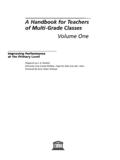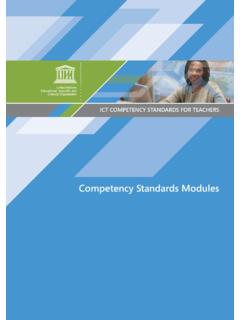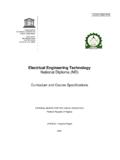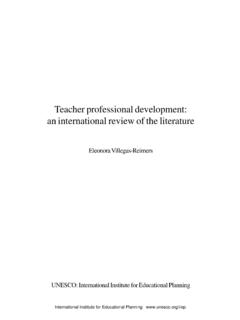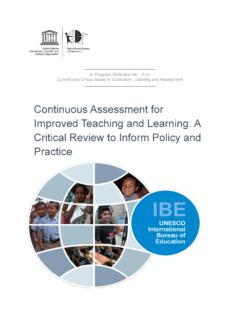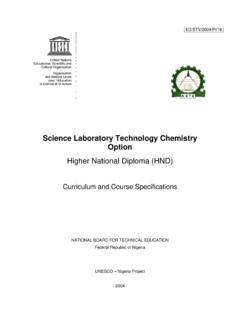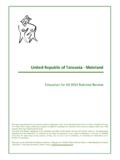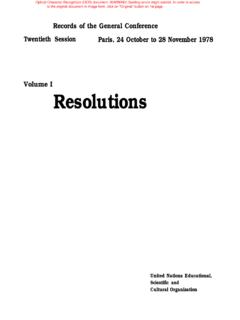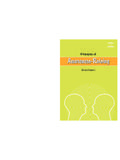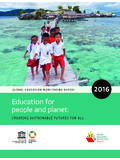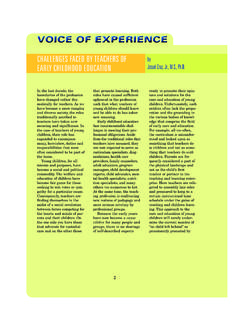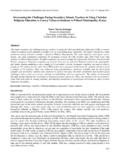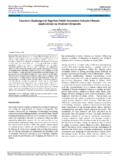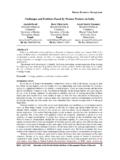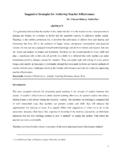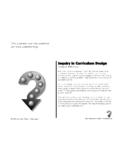Transcription of Current Challenges in Basic Science Education - …
1 Current Challenges in Basic Science Education Published by: UNESCO. Education Sector 7, Place de Fontenoy 75352 Paris 07 SP, France For more information, please contact: ED-2010/0/WS/42 CLD FOREWORD. Our world is profoundly shaped by Science and technology. Preserving the environment, reducing poverty and improving health: each of these Challenges and many more require scientists capable of developing effective and feasible responses and citizens who can engage in active debate on them. In order to achieve this, the 1999 Budapest Declaration underlined the importance of Science Education for all. Indeed, Science and mathematics Education (SME) that is relevant and of quality can develop critical and creative thinking, help learners to understand and participate in public policy discussions, encourage behavioural changes that can put the world on a more sustainable path and stimulate socio-economic development.
2 SME can therefore make a critical contribution to the achievement of the Millennium Development Goals adopted by the world's leaders in 2000. Recognizing this, UNESCO created the International Group of Experts on Science and Mathematics Education Policies, whose first meeting on SME in Basic Education was held from 30 March to 1 April 2009. The conclusions from this meeting, which form the basis for this publication, show remarkable consensus on the Challenges faced by SME today and how these can be addressed. All the experts agreed that the last decade has witnessed the development of a substantial body of knowledge on SME and the production of valuable tools and resources, many of which are now widely accessible thanks to technological advances. These are a firm basis to build on and open new perspectives for evidence-based policy for SME.
3 This publication therefore defines the Challenges faced in the implementation of quality SME in Basic schooling and, using case studies, sets out ways of improving its delivery. It will be of use not only to decision-makers wanting to mainstream quality SME Education into their systems, but also to stakeholders who wish to participate in the change process. UNESCO hopes that this publication will help mobilize the energy and enthusiasm of children, teachers and parents for improving SME. Indeed, working together on developing quality Basic SME in a sustained and coordinated way is the sine qua non for ensuring a fairer and more sustainable future for all. Qian Tang Assistant Director-General for Education UNESCO. Acknowledgements This document was prepared in the framework of the Science Education Programme of the Section of Secondary Education , Division of Basic Education .
4 UNESCO wishes to thank Charly Ryan for the preparation and drafting of this document. The Expert Group consultations and the different annexes drafted by various authors were crucial in ensuring the quality of the final text. Table of Contents 1. Introduction and Rationale 9 References 59. Science Education , Equity and Equality 9. Schooling, Science and Culture 11 Annexes 65. Science Education and the World of Work 12 Annex 1. La main la p te 1996-2010: Implementing a plan for Science Science and Globalization 15. Education reform in France 66. Summary 17. Annex 2. Networks and practice communities for improving motivation and learning 2. Science Literacy 19 in Science & technological Education 70. Beyond Science Literacy 19 Annex 3. Science teaching by inquiry Process and Content 22 for primary school 74.
5 Science for All 24 Annex 4. Learning about, for and through lemurs: Science and environmental Education in Madagascar and the UK through 3. Developing the Teaching sustainable teacher development. 77. of Science 29 Annex 5. A challenge for Science literacy: doing Science through language. 81. 4. Assessment and Learning 33 Annex 6. Science Education in the Philippines: Where To? 85. 5. Teachers and Science 37 Annex 7. Botany comes alive 88. Quantity and Quality 37 Annex 8. The child, the clown Teaching Science for All. 38 and the scientist 92. Annex 9. A CTC Science Classroom: Unique 6. Working with Others 41 Science Education solutions of Brazilian origin, 96. Annex 10. List of Participants 7. Science beyond the Classroom 43 in the expert meeting 100. 8. Spreading Good Practice 45. 9. Science and ICT 47.
6 10. Collaboration across frontiers 51. 11. Meeting Diversity 53. Language Issues 53. Gender Issues 54. 12. The Challenge for Research. 55. 13. Summary 57. 9. 1. Introduction and Rationale cience Education and Mathematics Education share several S commonalities in regards to the values, as well as Challenges . However, while the position of mathematics is well established with its own logic and approaches, the case of Science in several What follows is a review of reasons for Basic Education is rather different. At the international level, recognized in the Budapest Declaration, and often by national governments, the case including Science for Science in Basic Education is clear. However, its position in classroom as an essential practice is less well established, even in well-resourced systems, for example requirement of Australia or the United States.
7 This means that approaches to Science Basic Education teaching and learning are less widespread and so some of the Challenges for and the developing Science Education are different from those facing mathematics. Challenges that What follows is a review of reasons for including Science as an essential this presents to requirement of Basic Education and the Challenges that this presents to schools. Firstly, there will be a review of the role of Science Education schools. and how it can contribute to improving equity and equality. Secondly, we f l ways off draw on a view of schooling as an essential introduction to culture and to powerful thinking that humankind has developed (Savater, 2004). Science is seen as an essential part of culture and a powerful way of third reason is that Science Education is necessary for the world of work and the economy.
8 Finally, the challenge of making connections between globalization and Science Education will be explored. Science Education , Equity and Equality Scientific development in recent decades has, and will continue to have, a significant influence on topics that have great importance for humanity, quality of life, the sustainable development of the planet, and peaceful coexistence amongst peoples. From the immediate Basic essentials of life such as access to water, food and shelter, to important issues that affect us all (management of agricultural production, water resources, health, energy resources, biodiversity, conservation, the environment, transport, communication), all have a strong Science component to which everybody should have access to take part in local, regional, national and transnational decisions in a meaningful way.
9 We also live in a world where poverty and riches live side by side and where 10. the gap between them is increasing. The Declaration of Budapest argues The data clearly that what distinguishes poor people or countries from rich ones is that not only do they have fewer possessions but also that the large majority remain show that excluded from the creation and the benefits of scientific knowledge. The the greater data clearly show that the greater benefits that Science brings are unequally benefits that distributed. This translates into inequality and injustice between countries and Science brings between social groups. It reinforces the continuing exclusion of groups from are unequally the knowledge of Science and the benefits of its use, through belonging to distributed. particular ethnic, gender, social or geographic groups.
10 Science must not only respond to the needs of society in order to improve the quality of life of the majority population which lives in poverty; it should also be used by all citizens, men and women. To be usable, scientific advances have to be known and owned. The philosopher Fernando Savater, writing on this issue, is clear on the importance of Science for all and the impact of being excluded from such knowledge. One of the most perverse ingredients of poverty, allow me to insist on this, is ignorance. Wherever there is ignorance, that is where the Basic principles of Science remain unknown, where people grow without the ability to read and write, where they lack the appropriate vocabulary to express their longings and desires, where they are deprived of the ability to learn for themselves what they need to resolve their problems there reigns poverty and, there, there is no freedom, (Savater 2004, , author's translation.)
